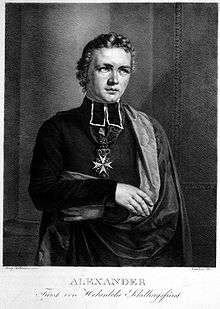Prince Alexander of Hohenlohe-Waldenburg-Schillingsfürst

Prince Alexander Leopold Franz Emmerich of Hohenlohe-Waldenburg-Schillingsfürst (17 August 1794 – 17 November 1849) was a German priest and reputed miracle-worker.[1]
Alexander was born at Kupferzell, near Waldenburg, and was a son of Charles Albert II, Prince of Hohenlohe-Waldenburg-Schillingsfürst (1742-1796) and his second wife, Baroness Judith Reviczky of Revisnye (from 1753 to 1836), the daughter of a Hungarian nobleman, entrusted his early education to the church and ex-Jesuit Rid. In 1804 he entered the Theresianum at Vienna, in 1808 the academy at Bern, in 1810 the archiepiscopal seminary at Vienna, and afterwards he studied at Tyrnau and Ellwangen. He was ordained priest in 1815, and in the following year he went to Rome. While in Rome, he entered the society of the Fathers of the Sacred Heart. Subsequently, in Munich and Bamberg, he was blamed for Jesuit and Obscurantist tendencies, but obtained considerable reputation as a preacher.
Alexander's first so-called miraculous cure was effected, in conjunction with a peasant, Martin Michel, on Princess Mathilde von Schwarzenberg, who had been paralytic for some years. Immediately he acquired such fame as a performer of miraculous cures that crowds from several countries flocked to partake of the beneficial influence of his supposed supernatural gifts. Ultimately, on account of the interference of the authorities with his operations, he went to Vienna in 1821 and then to Hungary, where he became a canon of Grosswardein and in 1844 titular Bishop of Sardica. He died at Vöslau near Vienna.
Alexander was the author of a number of ascetic and controversial writings, which were collected and published in one edition by S. Brunner in 1851.
References
- ↑
 Herbermann, Charles, ed. (1913). "Alexander Leopold Hohenlohe-Waldenburg-Schillingsfürst". Catholic Encyclopedia. New York: Robert Appleton Company.
Herbermann, Charles, ed. (1913). "Alexander Leopold Hohenlohe-Waldenburg-Schillingsfürst". Catholic Encyclopedia. New York: Robert Appleton Company.